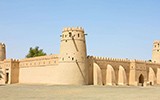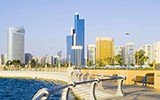Located in the Northern region of the United Arab Emirates, Ras Al Khaimah is becoming a popular city with expatriates due to its ...
Living in the United Arab Emirates guide for expats
All the information you need to relocate and live in the United Arab Emirates.
Our selection of articles for expatriation in the United Arab Emirates
Dubai is often called the city that never sleeps. People tend to associate Dubai with luxury hotels and expensive cars, but ...
Modern, vibrant, and cosmopolitan, Dubai attracts millions of visitors annually, as well as expatriates. With its dizzying ...
The desert inhabitants of the United Arab Emirates have used camels to get around for over 4,000 years. Before the 1970s, Dubai ...
Home to 9 million expats, the UAE is a very popular relocation destination. If you are employed by a company in Dubai, you will ...
The United Arab Emirates (UAE) is not only a popular destination for visitors around the world but also a great place to work for ...
If you are moving to the United Arab Emirates, you can rest assured that there are various leisure activities you can enjoy ...
The UAE is generally considered a tax haven for both individuals and businesses. However, it's not exactly tax-free. Foreign ...
If you dream of getting married in the United Arab Emirates, Expat.com provides practical information that you need to know ...
The UAE is a generally safe country to travel to and live in. It has a very low crime rate, and violent crime is rare. With that ...
Finding childcare services in the United Arab Emirates is possible for expats living mostly in the popular cities of Dubai and ...
Situated on the southeastern corner of the Arabian Peninsula, the UAE is home to a population of over 200 nationalities — ...
Relocating to another country, especially to somewhere like the UAE, involves a lot of preparation. However, with proper ...
Fujairah is one of the smaller emirates of the United Arab Emirates, located on the East coast. It is positioned as one of the ...
Located in the eastern region of Abu Dhabi, Al Ain is the fourth biggest city in the United Arab Emirates. It has been given the ...
About the United Arab Emirates
Obtaining residency visas and work permits in the UAE
One of the main reasons most expats move to the UAE is for work. If this applies to you, the first thing you will need to have is a residency visa and a work permit. Without these, you will not be able to legally work in the UAE.
To get your residency visa and work permit, you will first need to have secured a job. Once you have found your new job, your employer essentially becomes your sponsor and will be responsible for applying for these documents on your behalf.
Your employer will first issue a work permit, which will undergo an approval process and then serve as your entry permit. With this permit, you can enter the country and stay for up to two months.
During these 2 months, your employer will begin the process to obtain your residency visa and labor card and should guide you through all the requirements:
- A recent colored personal photo with a white background;
- Passport copy;
- Labor card or labor card receipt (to be applied for by the employer);
- A Medical Fitness certificate approved by the concerned authorities;
- Emirates ID Application (to be applied for by the employer);
- Medical Insurance (to be provided by the employer);
- Entry permit.
If you are moving to the UAE with family members, your employer should also accommodate their residency visas on your behalf. There are certain conditions and requirements the UAE government has highlighted for sponsoring family members:
- You must have a minimum salary of AED 4,000 or AED 3,000 plus accommodation;
- All family members aged 18 and over must also undergo and pass the Medical Fitness text. Those who are deemed medically unfit will not be granted a residence visa;
- You have 60 days to apply for family members' residence visa after entering the UAE using your entry permit.
One thing to note is that there are special cases where a mother can sponsor her children, but will need to go through ICP (Federal Authority for Identity, Citizenship, Customs & Port Security) approval.
If you haven't been able to secure a job in the UAE from abroad, you have the option to apply for a “Jobseeker Visit Visa”. This visa has a validity of either 60, 90 or 120 days, and allows you to search for job opportunities without the dependency of a sponsor.
Below is the eligibility criteria for obtaining a Jobseeker Visit Visa:
- You must have the Skill Level 1, 2, or 3 as per the Ministry of Human Resources and Emiratisation professional levels of jobs;
- Or, you must have graduated from the listed top 500 universities within the past 2 years;
- You must hold a bachelor's degree or equivalent;
- You must be able to provide a financial guarantee of AED 1,000.
You can find further details through our dedicated UAE work visa page.
High costs of living for high standards in the UAE
Depending on where you're moving abroad from, your view on the cost of living in the UAE may vary. However, the United Arab Emirates is seen as a luxury tourist destination, and the price of living there is generally considered to be higher than other countries. It is worth mentioning though that the country provides high living standards and services in return.
On average, an individual living in the UAE can expect to spend approximately $1,100 a month, whereas a family of four can expect to spend around $ 4,000. This would include everything from rent and groceries, to transportation and leisurely activities.
This cost may be higher or lower depending on:
- Your location - Cost of living varies from one Emirate to the other. Dubai and Abu Dhabi are considered to be the most expensive of the seven Emirates, while Ajman is considered the cheapest Emirate to live in.
- Your commute - Your chosen mode of transportation, as well as the distance you need to travel, will also have an impact on your cost of living. With this in mind, it's recommended to try and live closer to your place of work.
- Your accommodation - Naturally, your choice of accommodation will dictate your rental prices - which will also have a significant effect on your monthly expenses
- Your recreational and lifestyle choices - Going out in the UAE can be expensive, depending on where you go, but there's generally a wide variety of options to suit all budgets. Other easily available services, like cleaning, laundry and spa services, are optional and can alter your day to day costs.
- Your school choices - Your kids' school fees will also impact how much you spend per month. While international schools tend to cost a little more, expats are still expected to pay for public schooling in the UAE.
Generally, expats living in the UAE are looking for a place where they can save money. The country provides a variety of options to allow each individual to determine how much (or little) they want to spend to a certain extent.
Open a bank account from the comfort of your home in the UAE
One of the first things people think about when moving to a new country is opening a bank account. Luckily, this process is made incredibly easy in the UAE, though you'll have to wait until you arrive to start due to the following requirements:
- Original passport and passport copy;
- Visa page copy;
- Emirates ID card or registration form;
- Salary certificate.
Once you've met all the requirements, it's as easy as calling the bank and having them visit you at home or at the office. An agent will bring along all the paperwork you'll need to fill out and guide you through the process. From there, it takes just a few days for your account to be set up and active.
There are currently 23 domestic banks and 28 foreign banks in the country, so you'll be spoilt for choice.
The top local banks in the UAE are:
- Emirates NBD;
- First Abu Dhabi Bank (FAB);
- Abu Dhabi Commercial Bank (ADCB).
You'll find that most people living in Dubai will favor Emirates NBD, while those in Abu Dhabi will be more inclined towards FAB or ADCB. The other Emirates also each have their own banks, such as:
- Sharjah – Sharjah Islamic Bank;
- Ajman – Ajman Bank;
- Umm Al Quwain – National Bank of Umm Al Quwain;
- Ras Al Khaimah – RAKBANK;
- Fujairah – National Bank of Fujairah.
The UAE also has a range of Islamic banks, which essentially follow Sharia-compliant (Islamic law) banking. This means that these banks have many benefits, such as not charging interest, for example.
Some of the top Islamic banks in the UAE are:
If you're keen to open an account before arriving in the UAE, you can opt for a savings account. While this will not grant you access to a checkbook, the banks do provide debit cards that can be used to withdraw or deposit money at ATMs. It's important to note that these accounts usually have a minimum required balance, and at times may also have a maximum allowed balance.
Health insurance is essential in the UAE
The UAE currently has 157 hospitals, divided into 53 public hospitals and 104 private hospitals, and 5,369 health centers.
The UAE's public healthcare is government-funded, and administered by several federal and regulatory authorities to ensure a high standard of service.
While public healthcare is free for UAE nationals, expats will need to pay AED 320 for a health card, in addition to paying the relevant fees every time they use its services.
This is why most expats prefer to use the country's rapidly developing private health sector. As it can be costly, it is mandatory by law in Dubai and Abu Dhabi that sponsors to provide health insurance for its employees.
As with most countries, the level of coverage is dependent on your insurance plan. If the insurance provided to you by your employer seems insufficient, you can always opt to invest in one of the following available medical policies:
- Individual insurance - This is available for individuals in a basic plan, which covers existing conditions, and in an enhanced plan, which covers additional illnesses and conditions;
- Family insurance - This allows for multiple family members to be covered under a single insurance policy;
- Senior Citizen Plan - This is available for those above the age of 60, and is only provided by a handful of insurance companies;
- Critical Illness Plan - This plan provides coverage against critical diseases not usually covered in a standard healthcare policy.
Some of the top health insurance providers in the UAE are:
- Takaful Emarat Insurance Company;
- Gulf Insurance Group;
- National Life and General Insurance Company.
A tax-free haven in the UAE
Like many countries in the Middle East, a huge perk that attracts expats to relocate to the UAE is the benefit of tax-free income. Having all of your hard-earned funds arrive in your bank account with no cuts makes it a lot easier to save money.
While the residents of the UAE can enjoy the luxury of no income tax, there are other taxes and fees put in place which are important to note:
- Value Added Tax (VAT) was introduced in January 2018 at a rate of 5% and is applied to all supplied goods and services;
- Expats who are Gulf Cooperation Council (GCC) nationals are subject to a social security regime of 17.5%. This percentage may vary based on each of their home countries;
- Hotels impose a Tourism Fee, which adds an extra 5% to your final bill;
- A housing fee is applied for expats in Dubai, which is calculated at 5% of your rental value. This sum is paid monthly as part of your DEWA (Dubai Electricity & Water Authority) bill;
- The UAE government in Dubai charges a Knowledge fee of AED 10 for every service provided by the government. This is used to support educational and cultural projects;
- The Dubai government further charges an additional Innovation fee of AED for every service provided, which goes towards supporting innovation-related projects.
Affordable public transportation in the UAE
Public transportation in the UAE is widely available and generally affordable across the country, making it easy to get around within each emirate, as well as traveling between different Emirates. Although the UAE is considered one country, each emirate has its own transportation authority.
Public buses are available throughout the country and operate within each emirate, as well as between them, according to specified schedules. Bus rides within a city have a standard fare of around AED 2, while the cost to go from city to city is around AED 10.
Bus cards can be purchased in the following emirates:
- Abu Dhabi – Hafilat Smart Card;
- Dubai – Nol Card;
- Sharjah – Sayer Card.
Taxis are widely accessible and can either be hailed from the road or booked in advance. The UAE also provides specified taxis for women and children, and for people with disabilities (people of determination). Booking a taxi is easy and can be done through the following methods:
- Abu Dhabi – Via phone on 600535353 or via the Abu Dhabi Taxi app;
- Dubai – Via phone on 04-2080808 or through the Careem app;
- Sharjah – Via phone on 600525252 or through an online booking form;
- Ajman – Via phone on 600599997;
- Ras Al Khaimah – Through the Careem app.
Starting fares for taxis also differ between the emirates, with rates from AED 3.50 and up to AED 11.50.
Dubai operates both a metro and tram system which runs through most of the city. Each station is situated next to a bus stop and taxi stop, to facilitate commuting into areas where the rail network cannot reach. The same Nol card used for public buses can be used to access the metro and tram, or individual tickets can be purchased through kiosks at every metro station. Dubai trains and trams also designate specific areas for women and children, as well as “Gold Class” ticket holders (which are more spacious).
Visit the different emirates of the UAE
The UAE is made up of seven emirates, each with their own character and charm. Dubai and Abu Dhabi are reminiscent of some of the major cities around the world, Sharjah is known for its cultural appeal, Ajman and Ras Al Khaimah boast beautiful mountain ranges, Umm Al Quwain is home to serene beaches, and Fujairah's landscape is a treasure to be explored.
Planning day trips and staycations in other emirates is incredibly easy, and something that should definitely be taken advantage of.
Abu Dhabi is the UAE's capital and is the largest of the seven emirates. It is home to two record-breaking theme parks, Yas Waterworld and Ferrari World, promising hours of fun for children and adults alike. Visitors and residents can also enjoy a relaxing break on one of its stunning islands, like Nurai or Saadiyat. Some of Abu Dhabi's top tourist destinations are the Sheikh Zayed Grand Mosque and the Louvre.
Dubai is the UAE's metropolitan city, where most expats come to reside. It is known for its fast-paced lifestyle, beautiful skyline, and of course, the Burj Khalifa. Whether you're living in Dubai long-term or visiting for a short while, there is never a shortage of things to see and do.
For a healthy dose of Arab culture, Sharjah is the emirate to go to. Though the entire UAE is officially a Muslim country, Sharjah has held on to its cultural values and traditions the most. The Heritage Area encompasses several tourist attractions that celebrate local architecture and Emirati culture.
A unique feature of Umm Al Quwain is the many pet-friendly hotels and beaches, where you and your fur babies can escape for the weekend. For a taste of nature, Mangrove Beach is the perfect activity, where you can kayak or paddleboard through the creek.
Hiking enthusiasts usually take trips to Ajman, Ras Al Khaimah, or Fujairah, which have no shortage of impressive mountains and trails. Multiple routes are mapped out for everyone, from beginners to advanced hikers. Be mindful of the time of year, though, as summer months may not be suitable for such activities.
Sunny all year long in the UAE
The biggest culture shock people experience when moving to the UAE is its extreme weather. While year-round sunshine sounds great, the heat is definitely something to prepare for.
During the summer months, temperatures can soar to as high as 49°C, making proper hydration more crucial than ever. All indoor areas are equipped with air conditioning, making the heat bearable. You'll also notice a spike in humidity levels during this time, which averages at around 60%.
The cooler months average at around 20°C, with colder temperatures going down to about 10°C, making way for pleasant outdoor activities.
Rain is sparse in the UAE, which means you'll rarely come across a gloomy day.
Spoken languages in the UAE
As you would expect of a country in the Middle East, the UAE's official language is Arabic. It is spoken in a specific Emirati dialect, which is part of the Gulf dialects.
Despite this, you do not necessarily need to learn Arabic in order to get by in the UAE. English is widely spoken and understood across the country and would be enough for your day-to-day. In the workplace, speaking the Arabic language is definitely seen as an added advantage, although it is not always required. You may come across a few people in the service industry who do not speak English, but in just a few months you'll be able to pick up on some basic Arabic words to help you communicate in these rare cases.
Here are a few words to help you get started:
- Marhaba – Hello;
- Shukran – Thank you;
- Cham – How much;
- Yalla – Let's go (a favorite among many Arab speakers).
Based on the current population, Hindi and Urdu are also commonly used amongst those who consider them their first language.
Cultural considerations in the UAE
We all know the UAE is a melting pot of different cultures, but there are some considerations to keep in mind when relocating to Dubai or the UAE.
Excessive public displays of affection, even between married couples, are frowned upon. While it may be acceptable to hold hands and hug in public in Dubai and Abu Dhabi, kissing and touching can get you into trouble with the police throughout the country.
As the UAE is a Muslim country, you can expect to hear the call to prayer five times a day, depending on where you live. If you are out in public and can hear the call to prayer, it is considered respectful to turn off any music that may be playing until the call has ended.
Modest dressing is generally recommended in the UAE. Dubai and Abu Dhabi are an exception, where you'll find people dressed in many different ways. However, in Sharjah, for example, men are even frowned upon for wearing shorts. It should be noted that across the country, including in Dubai and Abu Dhabi, both women and men are expected to dress modestly when entering government buildings. Women whose clothing is considered too revealing and men in shorts will usually be refused entry.
As per the law, it is legal for non-Muslims to consume alcohol at home and in licensed places (although you will find that people are served regardless of their religion). Consuming alcohol in public is strictly prohibited, and displaying drunken and disorderly behavior can get you in trouble with the police. Alcohol is completely prohibited in Sharjah.
You may find that some Arab men or women will decline to shake hands with someone from the opposite sex and will place their hand over their heart as a greeting instead. Do not take offense at this, as it is related to religious and cultural traditions. Instead, it is polite to return the gesture with a smile and a nod.
Useful links:
Latest housing offers in the United Arab Emirates
Latest job offers in the United Arab Emirates















